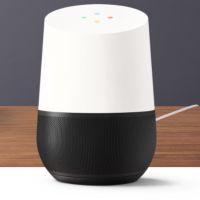Google's personal assistant comes back with the promise of the world's most formidable search engine, but with the Amazon Echo already on the market for some time now, does it fully utilise it?
I will start by saying upon purchasing a Google Home, I went in to it with a great deal of confidence. I saw this as a home assistant that I could be as useful to me in work, as in play. Seamlessly switching from fact-checking an article for me prior to publication, to thumping out some of my playlists at the end of the day at my beck and call. Thankfully, this has been the case, for the most part.
Asking questions of your Google Home is a simple and satisfying experience. Ninety percent of questions I asked it were answered successfully. The amount of information you can retrieve effortlessly is impressive, even though at times you must be very careful with your wording or pronunciation to achieve this.
Whilst the encyclopaedic knowledge you can call upon is so vast, the device leaves much to be desired in terms of real time information, and how it handles blocks of questioning, or doesn't in this case. One example would be flight times and prices. Many early reviews suggested that it effortlessly could retrieve costs for you between two locations at your command. This is technically true, but you can't help but notice that it has no memory or consideration of the previous question. There is a lack of indexing, a lack of ability to draw any kind of comparison. I do expect this is something that may evolve over time though, but these issues extend to a lot of other tools that you could presume would be ready to go straight out of the box.
Google Maps is an exciting tool that has been evolving month by month. Frequent updates to the app on smartphones and the Google App suite within your browser have made it very easy to reliably plan public transport routes. When asking simplistic questions about train times the device would let me know that it was currently unable to provide this, but was "always learning".
I do believe we will see the capabilities of the Google Home evolve drastically over the coming years, but in the short term it's hard not to feel a degree of frustration that it isn't already able to integrate with many of my smartphones Google apps already, since it makes such great sense to do so. It's worth a mention that apps like Audible, and certain podcast platforms don't seem to work. With Audible this is hardly a surprise, since it's an Amazon app, but many Audiobook listeners are sure to find this an irritating roadblock for a device that you want to be your universal media hub. It should also be noted that pairing this device with a Google Chromecast will allow you to voice command media on your television. If you don't have a smart TV, but do have a USB port, it is an excellent option. If you are looking to build a fully integrated smart home, most of the leading central heating and lighting brands/apps already have adopted the device.
Audio
Although the focus on this device is primarily as an assistant, the audio capabilities are more than serviceable, and compare well to many wireless speakers. I didn't find the sound quality to be quite as rich as that of my free standing Sonos speaker, but it wasn't a million miles off. If you'd like to be able to call upon your music library with a simple command, the Home is an excellent choice. Interaction with music streaming apps is excellent. The only minor issues I have experienced is a puzzling inability to find a song that I had successfully commanded earlier in the same day, or occasionally misheard pronunciation. I think there can be a confusing mixture of clashes with how each individual app indexes their music files, and sometimes just plain mishearing.
Design
Aesthetically the Google Home design is clean, unobtrusive and stylish. Customisable with interchangeable coloured fascia's, you can make it more of a feature of the room if you choose. Ironically, leaving it with its default white and grey colour scheme makes it look most at home amongst Apple products. The four coloured lights that emit upon interacting with the device however are distinctly Google. It does feel a little bit satisfyingly sci-fi to do so.
Summary
Currently available at a price point of £99, if you have the money to spare it represents value for money in terms of is capabilities as a voice commanded speaker alone. As an assistant, its ability to pull from Googles own search engine effortlessly is brilliant, but still requires some refinement in terms of its ability to give real time information. With minimal scheduling options, and not enough detail in terms of traffic and travel application, it's currently difficult to see many professional benefits as it stands. However, we will be keeping a keen eye on its evolution in the future.
Ian Westcott






